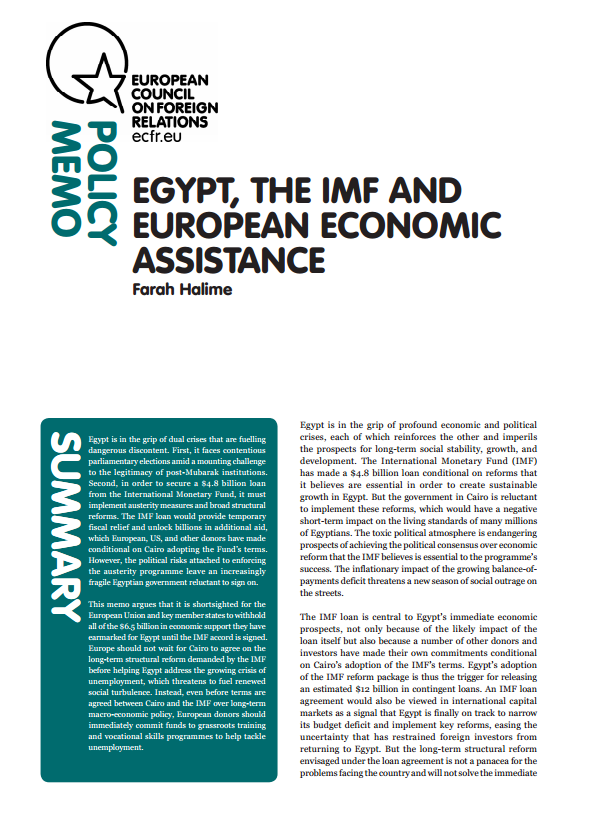Egypt, the IMF, and European economic assistance
How Europe can help Egypt
Egypt is in the grip of an economic crisis, with rapidly rising unemployment threatening stability ahead of elections in October. The government desperately needs money, but is reluctant to sign up to structural reforms that would unlock billions in aid because it fears this will make a bad situation worse.
Europe can help. Instead of withholding all of the $6.5 billion it has earmarked for Egypt until the IMF’s comprehensive reform programme is signed, it can target some funds immediately at measures that will reduce unemployment, stabilise Egypt, and help the country’s fragile democratic institutions.
In an ECFR policy memo – “Egypt, the IMF, and European Economic Assistance” – Farah Halime argues that although structural reform is necessary to deal with Egypt’s deep rooted economic problems, it would be short sighted for the EU and key member states not to act now.
- They should invest in young people, with the Egyptian private sector still struggling to find qualified employees despite unemployment levels. Donors should target vocational training programmes for young Egyptians.
- The EU is already due to sign two programmes that put millions of dollars into infrastructure projects and technical skills training. These, plus World Bank funding for small and medium enterprises, should serve as a model for smaller, targeted aid programmes.
- Europe should still stand by the IMF’s comprehensive reform programme, aimed at fixing long-term structural problems in Egypt’s economy.
“Egypt is caught in a Catch 22 situation: it needs cash to prevent instability in the face of unemployment and economic collapse, but it can’t get the cash without signing up to reforms that would themselves cause more short term instability. Europe must commit some money to grassroots training now to avoid this Catch 22 destroying the consolidation of democracy in Egypt.” – Farah Halime
Useful facts:
- Agreement on the IMF’s comprehensive reform programme would then unlock a $4.8 billion loan from the IMF itself, along with $6.5 billion from the EU and key member states.
- Inflation, falling revenues from tourism, massive subsidy programmes and dwindling foreign reserves are putting the government budget under extreme pressure.
- Egypt has looked elsewhere for cash, including Qatar, Turkey and Libya.
- 4,500 factories have shut down since the revolution, with those remaining plagued by power cuts, strikes, poor security and bad credit conditions.
- Around ¾ of Egypt’s unemployed are between the ages of 15 and 29.
- Eight out of ten university graduates are unable to find work.
- Foreign Direct Investment into Egypt has fallen by 56% since the revolution.
The European Council on Foreign Relations does not take collective positions. ECFR publications only represent the views of their individual authors.



